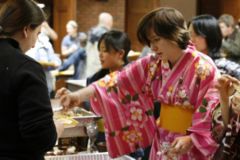Main Page
|
Other languages: Español |
|
Welcome to The Wiki Fire
the free encyclopedia about Knox College that anyone can edit.
2,758 articles in English
|
| Academics | Campus life | Galesburg | Disorientation |
|
Welcome to The Wiki Fire's Disorientation guide. Use this guide to survive and adapt to your scholastic jungle.
|
| Selected Features | Useful Links | |
|---|---|---|
|
To nominate articles to be featured here, see the talk page.  A flu being called The Knox Plague is spreading through the student body.
The Knox plague is a strain of the flu virus that is affecting large portions of the student body. Symptoms include coughing, fever, sore throat, nausea, a monstrous headache, body aches, and sometimes diarrhea. If you go to the Health Center, they will give you three prescriptions: one for your cough, one for the sore throat, and another one for nausea. They will also tell you to take a lot of ibuprofen, and tell you not to go to class for a few days.
Alternative Menstrual Products are products used instead of tampons or disposable pads. Often women prefer these types of products because they are more affordable, better for the environment and support women's health. Some are available at Cornucopia in town.
 The lower level of the California Zephyr. The California Zephyr is considered among the most scenic Amtrak routes. California Zephyr riders are a curious bunch. They come from various walks of life, although they are rarely in a hurry, given the train's schedule issues. A large number of Knox students use the California Zephyr, generally for travel between Knox and points west. Most experienced Knox students know not to use the California Zephyr for westbound travel to Chicago.
Post-Bunkism assumes that arguments cannot refer to some discrete or objective truth, and thereby cannot obfuscate the truth to a greater or lesser degree. Post-Bunkism basically says, "philosophical discourse is full of bunk, and as such, we're going to play Red Rover as a meaningful philosophical statement."
Japanese Club was initially created as an organization for those interested in Japanese popular culture, primarily anime, manga, and video games. However, since 2003, popular culture became the territory of such organizations as Anime Club and the Gaming Information Network. The purpose of Japanese Club has shifted to promoting awareness of other aspects of Japanese culture, including traditions and holidays, cuisine and non-animated films. |
|
